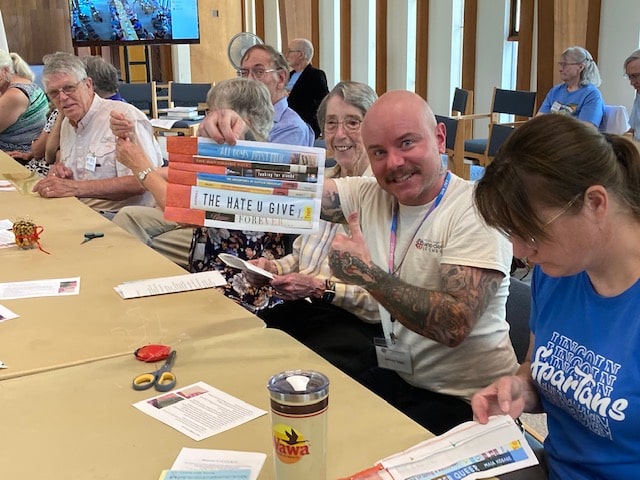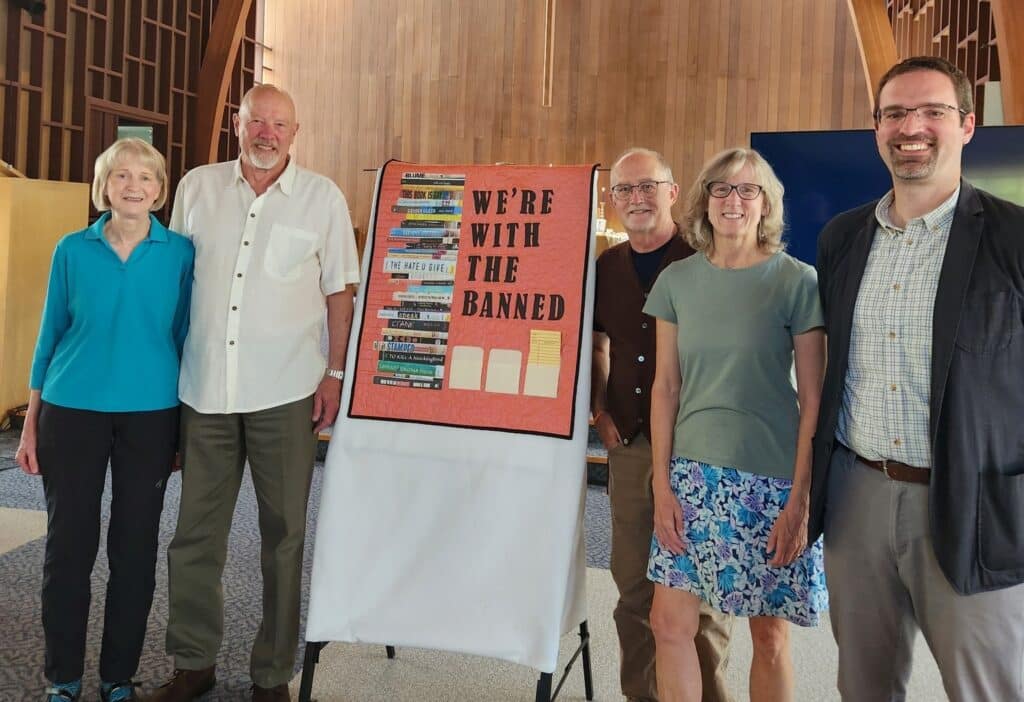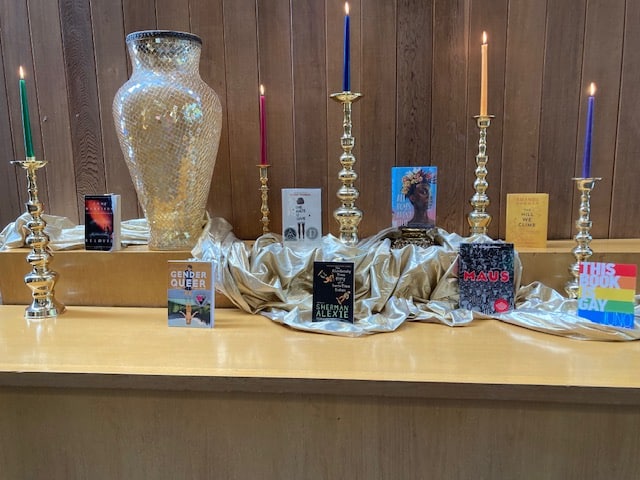Sewing, quilting and banned books: Washington church creates new way to worship
An assembly line of people pinning fabric and hand sewing might not be what comes to mind for a church service.
But that’s the point for the people of Community Congregational United Church of Christ in Pullman, Wash. — they wanted to try something new.
Since church attendance can be a little more in flux during summer, especially in a small college town like Pullman, interim pastor the Rev. Gary Jewell invited congregants to offer ideas for trying something different in worship.
Lisa Carloye responded with the idea for attendees to collectively create a quilt as part of worship based around the topic of book bans that have risen around the country in the past two years. Book bans rose nearly 40% in 2022 over the previous year, and the vast majority of targeted books feature LGBTQ+ characters or characters of color, or topics related to racism, LGBTQ+ identities and sex education, according to data from PEN America.
Her idea grew out of reading articles about what young people tend to be seeking from a church — “something hands-on and meaningful so that they feel like they’ve done something,” she said. From there, she brought together the hands-on activity of quilting, which she described as good for fellowship and forming community, and the topic of banning books that kept coming up in the news.
“The bans now are targeting social justice issues that we have been talking about and care about deeply. It seemed like a good fit because so much of it is about racial issues, LGBTQ issues — a lack of community or wanting to understand people different than ourselves is what’s at the heart of banned books,” she said. “So, I brought all that together and thought, ‘Let’s piece a quilt together.’”

Quilting as worship
People gathered around long tables in the sanctuary July 16 for a worship service where some traditional elements of worship — hymns, a message, music — merged with interactive elements of quilting.
“I didn’t want it like an add-on or a craft project,” Carloye said. “It is worship.”
Carloye had photographed the spines of 18 banned books that she tracked down in bookstores and libraries, then printed these onto fabric.
After opening liturgy and hymns, people received instructions about the stations set up for quilting tasks. A flutist played instrumental music while people learned and chatted.
People from their teens to their 90s joined in the assembly line-like process of pinning the book spines together, drawing lines for seams and sewing the book fabrics together by hand. Carloye’s mother ironed the seams open, and then “runners” carried the fabric back to the first station to begin the process again with more books.
Once people got into the flow of things, Jewell offered a message based around the Scripture of Jacob wrestling with God that focused on “the importance of being seen and recognized and able to struggle through your journey and wrestle with God,” Carloye said. “[Jewell] did a great job tying what we were doing and the books being banned to Scripture.”
‘A chance to take a risk’
A balance of traditional elements like a sermon and new skills like hand stitching were intentional.
“I feel strongly that we need to retain the fundamental structure for members of what church is,” Carloye said. “That’s a thing that I really like about this is that we embedded it in a regular worship service, so it was something familiar and something different.”
Carloye, who describes herself as a “dabbler” in quilting, teamed up with Nancy Mack, an experienced quilter who attends the church, to bring the idea into worship.
It was important to them that they make the tasks accessible. The two had invited Carloye’s spouse, who was unfamiliar with quilting, to engage in the tasks ahead of time to find what he felt comfortable learning to do, Mack said. They also pre-threaded needles for the congregants and developed a wide variety of ways to participate in different stations.
“I made a real point in saying you don’t have to do a great job or know what you’re doing,” Carloye said. “It’s a good chance to take a risk.”

‘We’re with the Banned’
The following July 23 worship service focused on the topic of book banning.
Mack finished quilting what the congregants created during the week, adding words in block lettering to say, “We’re with the Banned.” She also added three pockets to hold old fashioned library cards for people to sign in support.
With the finished quilt on display, Dan Owens, director of the local Neill Public Library, served as a guest speaker to address how banned books impact libraries. Bill Condon, a church member and retired literature professor, spoke about what is lost with book bans.
The project invited Carloye and others to further consider the impact of banning books. “For me, I thought about how we lose the opportunity to walk in other people’s footsteps and gain empathy and insight into other people’s lives …With the negativity and negating people’s stories, we lose that sense of community, kindness and compassion.”
As part of the worship service, everyone was invited to take turns signing the library card tucked into the quilt’s pocket.
“That was a really nice moment,” Carloye said. “It was a way to let them see the finished quilt that they had started and participated in and make a public declaration of their own sense of this as a social justice issue and be a witness to that.”
Traveling quilt
The quilt, which is a wall-hanging size, is ready to carry on the conversation beyond the sanctuary. It is designed so new library cards can be added to collect additional names of support.
“We want to take the banner and make it available to other churches, other libraries, maybe city hall — any place where they would recognize the importance of the issue,” said Mack, who serves as head of Community Congregational UCC’s outreach team.
The quilt’s next stop: the local library.
Owens shared that their library hasn’t had requests to remove books. Instead, people have asked how to help support access to books that get banned.
The quilt can give people “a tangible way to feel like they can do something or let their viewpoint be known,” Carloye said. “It provides an outlet for people who care about the issue but don’t have a way to solve the problem. They can express support for the issue in a public setting.”
Content on ucc.org is copyrighted by the National Setting of the United Church of Christ and may be only shared according to the guidelines outlined here.
Related News
A Moment of Silence
The weekend news was alarming. Two students shot and killed with 9 injured at Brown University...
Read MoreIn hope-filled worship service, UCC and United Church of Canada celebrate full communion past and future
On Saturday, Dec. 13, many from the United Church of Christ (UCC) and the United Church of...
Read More‘A Gift of God to the World:’ Christmas greetings from the General Minister and President
As Christmas quickly approaches, UCC General Minister and President/CEO the Rev. Karen Georgia...
Read More


